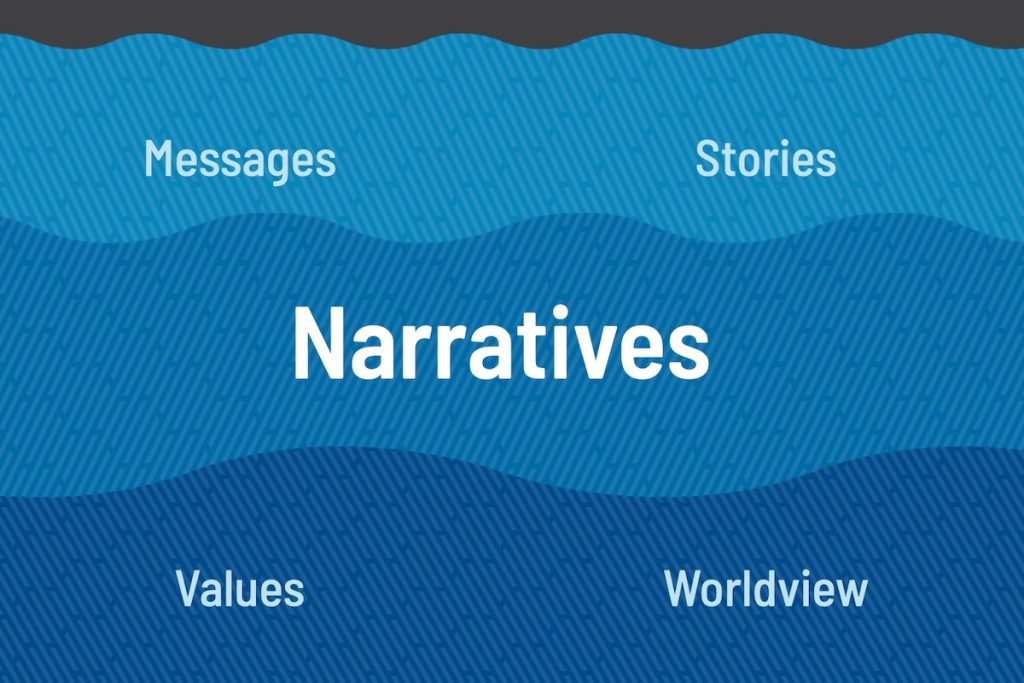What’s the role of narratives and how do we update them once they’ve become obsolete? Anna Simpson discusses the process of shifting narratives in follow up to 2020, the agents and power dynamics implicated, and the role of futures as a tool to help us navigate away from polarisation and zero-sum solutions and co-create a new, truly democratic narrative.
Imagine you’re turning your home into a gallery of your life. You walk through the rooms, deciding what to display and what to hide away. You pick up a clay pot your grandmother made: this stays for sure, you murmur – resourcefulness runs through your family’s veins. You leave the shoe rack at the door: a non-negotiable of any Asian household. You position your water filter on the kitchen table: a small but pragmatic response to one global challenge.
This picking and choosing is the work narratives do in society. They take our values and worldviews and translate them into ways of being and doing, through the stories they tell. As Future Narratives Lab puts it, “Narratives are the deep patterns in our culture and discourse that determine what is prioritised and seen as relevant, and what is put aside and dismissed.” Narrative Initiative uses a simple model of waves to say something similar.

Source: https://narrativeinitiative.org/blog/waves-a-model-for-deep-narrative-change/
To some degree, we are all narrators. Have a listen. What stories are you living by, what roles are you playing, in the choices you make day-to-day? Which habits, patterns or objects in your home reinforce your story?
“Are you making progress?” my mother would ask me as a child, meaning, ‘Have you done your homework?’ Dig under the question and you’ll find a liberal narrative of personal endeavour for the betterment of society. But does ‘progress’ mean the same thing today?
Not to many: the idea that human agency and technology can provide answers to complex problems, improving lives in a linear fashion, rings alarm bells. If we focus too narrowly on providing solutions to singular challenges, we develop blindspots to more complex outcomes. Antibiotics, for instance, are both yesterday’s solution and tomorrow’s nemesis. Culture Hack Labs identifies ‘progress’ as the narrative source of much inequality: it offers a “license for the limitless expansion of Man towards his own perfection”, at the expense of all that is ‘other’.
This is a time of narrative change: the fundamental stories we tell ourselves, the ones that help us decide how to live and who to be, are shifting. How can we know? Because the old narratives no longer make sense to us. You can tell, says a report by Culture Hack Labs, by the degree of polarisation today. Disinformation forces aren’t helping.
We’re finding ourselves stranded on the shores of old narratives as they crack down the middle. We can hardly hear what people are saying on the opposite bank. Some sounds reach us but their meanings are distorted. We feel confused, challenged, even repulsed. Eventually we give up and stop listening.
This year has acted as a massive accelerator for narrative change. We’re questioning assumptions that have held for generations – such as the right to socialise or travel at will, or the importance of face-to-face meetings in creating change or doing business. And difficult ethical dilemmas have become urgent topics of debate: do we opt for fewer cases in the short-term, or more jobs in the long-term?
As we pick our way through the debris of yesterday’ narratives, we have an opportunity. It’s a short window, but now is the time to think about what new narratives we want for our future. Forum for the Future’s latest Future of Sustainability report calls on us to “Recognise that change will require shifting mindsets and influencing deeply held belief systems and values”, and to “Play a role in crafting and supporting the narratives that will underpin a new future.”
Even saying this is part of an emerging narrative of co-creation: the belief that new ways of living, new systems are ours to create… Before this narrative takes any set shape, there’s time to ask, who’s implied by the ‘co-’? Who’s left out? And is there time to take a pause, step back and listen to distant voices emerging on the horizons?
This piece offers a quick dip into current writing on shifting narratives. Take it as a new year reading list. Take it as a spoon of spaghetti soup: look for patterns in it, chew it over.
Who’s watching the waves of narrative change, and what are they saying?
- Culture Hack Labs calls on us to find ways to bridge the divide as old narratives crack down the middle. Its report, Transforming the Transition, describes two opposing ideological reactions to a common sense of crisis: authoritarianism on the one-side, powered by fear, and progressive ‘resistance’ movements on the other. The essential collective survival challenge, it says, is to move beyond the zero-sum game, in which each side sees the other as the disturber of the peace: “After all, our fates are bound together by the fact that we are all facing the same existential threats.”
- New narratives are possible, says Phoebe Tickell, founder of Moral Imaginations, using the analogy of a runaway train to describe how we are opening our eyes to the current crisis and realising change is possible. One narrative she is disrupting is that of the human as an individual: instead, she invites us to see ourselves as “multicellular mosaics of beings”. She began a talk at London’s Serpentine Gallery with a meditation inviting attendees to think about calcium carbonate, the material of our bones, remembering that it’s essentially the same stuff as dinosaurs bones, and then to reflect on mitochondria, the living bacteria working as powerhouses in every single one of our cells…
- Common Cause Foundation seeks a shift in narratives that shape how we express human values such as care and compassion. The report ‘From neighbourliness to social justice’ argues that it’s possible to shift from a narrative that prioritises loyalty to an ‘in-group’ of family, friends and those culturally similar to us, towards a narrative that enables us to feel care for people who are different to us, and for other living beings.
- Future Narratives Lab also sees a shift away from the idea that humans are inherently ‘utility maximising’ and selfish individuals, a core tenet of modern economic theory. Its recent study, Power in Place, looks for ways beyond narratives that have determined our approach to land, such as the Tragedy of the Commons: “a long disproven but still hugely influential trope, asserting that collaborative ownership will inevitably lead to resource depletion and destruction”. It believes a new narrative is possible that combines ‘conservative’ values of order and respect, with ‘universalist’ values, such as environmental justice and unity with nature, and also encourages collective creativity.
- Sumi Madhok at London School of Economics, whose new book ‘Vernacular Rights Cultures’ comes out in 2021, aims to tell different stories of rights and human rights. She critiques the eurocentrism of established rights narratives, and explores different ideas of justice and citizenship in India and Pakistan. Her work is influenced by intersectionality: how different aspects of a person’s social and political identities (such as gender, caste, sex, race, class, sexuality, disability and more) combine in discrimination and privilege. Judith Butler is another influential voice proposing a new way of thinking about who we are in her latest book ‘The Force of Non-Violence’.
How do narratives change?
Wish lists for new narratives are already well, but what is the actual process for changing something so fundamental? Is it even possible to find our ways out of the vocabulary and worldviews that keep narratives alive? As Future Narratives Lab describes, existing narratives reinforce themselves by pre-emptively discrediting alternatives. History plays its role, encouraging us to see the status quo as the natural order of things.
Another source of commentary on how narratives change is Narrative Initiative: a team of narrative practitioners who have backgrounds in art, social justice, organizing, research, philanthropy, and more. Here are some insights from their work:
- Technology has always played a role in how narratives are shaped. (This reminds me of Marshall McLuhan’s truism “The medium is the message”, from ‘Understanding Media: The Extensions of Man’, published in 1964). How is technology enabling and restricting the essentials of what we communicate today? Narrative Initiative identifies some narrative tech tools, from ‘Big Listening’ (by analysing massive data) to community organizing, and ‘storybanks’ (such as podcasts). It also prompts us to ask what narrative tech we want in future. A more fundamental question would be, do we want technology to play a role in shaping new narratives, and which roles are appropriate?
- ‘Waves’ (mentioned earlier) is an influential model of narrative change, drawing on the work of Grassroots Policy Project, Perception Institute and others. As Narrative Initiative puts it: “Imagine floating in the middle of a vast, stormy ocean. Swells emerge from seemingly nowhere; we are tossed and turned by the churn of waves. Trump’s tweets, both constant and unpredictable, keep us disoriented on the ocean’s surface. But waves are generated by currents beneath the surface. Their power is sourced from below, just as the tweets draw from less visible narratives to deliver meaning […] And the deeper the currents, the more powerful and enduring they can be, functioning like worldviews and ideology.”
- ‘Four Baskets’ is a framework for narrative change that prompts you to craft new narratives (‘Create’), help others connect with them (‘Translate’), try and test them to find out what works (‘Deploy’) and work towards scale (‘Observe Together’).
- ‘Polyvocal narrative strategy’ looks beyond silos in advocacy for change, bringing different voices together as a collective force. Narrative Initiative defines polyvocality as “the power of many voices to shift and sustain narrative change.” Key to this is diversity: not just many voices, but voices from different sources and bringing differing perspectives.
Narrative Initiative also recognises futures, the raison d’etre of the Futures Centre, as a creative tool for narrative transformation. Futures helps us to question the assumptions that keep old narratives in place by exploring multiple possibilities and trajectories. It offers ways to reframe our perspectives, drawing us out of stuck patterns of thinking and perceiving. Last year, I wrote a paper for the Journal of Futures Studies exploring how futures can help reframe the narratives that render conflicts intractable.
The narrative underlying futures is one of possibility. Instead of a predictable future that can be extrapolated from today’s reality, it evokes multiple possible alternatives to today’s systems and structures. It calls for a mindset where different possibilities can dwell alongside each other, rather than cancel each other out. In doing so, it can offer a crucial response to the zero-sum narratives that Culture Hack Labs warns against.






Thank you for this great explanation of why narratives matter – shaping what we see as important or irrelevant, and what patterns we spot. And even more for the summary of good thinking and frameworks on how narratives change.